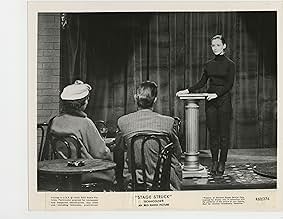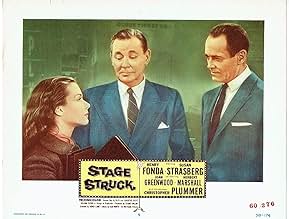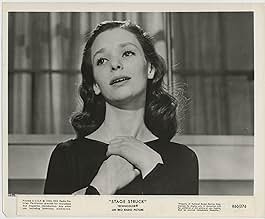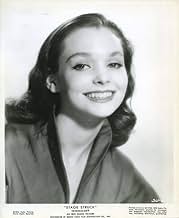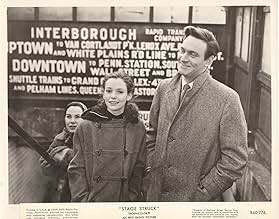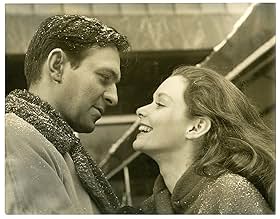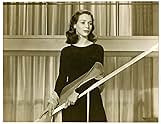A young woman arrives in New York City determined to become a great theatrical star, but discovers that her goal may not be as easily attainable as she had hoped.A young woman arrives in New York City determined to become a great theatrical star, but discovers that her goal may not be as easily attainable as she had hoped.A young woman arrives in New York City determined to become a great theatrical star, but discovers that her goal may not be as easily attainable as she had hoped.
- Director
- Writers
- Stars
Pat Harrington Sr.
- Benny
- (as Pat Harrington)
Pat Englund
- Gwen Hall
- (as Patricia Englund)
Merle A. Ashley
- Minor Role
- (uncredited)
Dario Barri
- Handsome Young Man
- (uncredited)
Rolly Bester
- Minor Role
- (uncredited)
Leon Bibb
- Guitar Player
- (uncredited)
- Director
- Writers
- All cast & crew
- Production, box office & more at IMDbPro
Featured reviews
Susan Strasburg was method acting guru Lee Strasburg's daughter.The film is peppered with acting luminaries such as Henry Fonda, Christopher Plummer and Herbert Marshall. I was however strongly reminded of a film on a rather similar theme "All about Eve" where again an ambitious young novice actress seeks to advance her career - at the expense of ageing actress played by Bette Davis. The screenplay by Joseph L. Mankiewicz has become immortal as in "Fasten your seatbelts, it's going to be a bumpy night! ".
Not one line of Stage Struck is memorable. My attention was only briefly attracted by something surely unintended around 30 minutes in. Strasburg, Fonda and Herbert Marshal perform part of a Shakespeare play. Henry Fonda was OK but Susan Strasburg quacked and gave no indication of promise even. But Herbert Marshall spoke his lines wonderfully. Marshal, I suddenly realised had wasted and misdirected his talents, not least here.
Interesting Herbert Marshall trivia: During the First World War, Marshall served ... with fellow actors Basil Rathbone, Ronald Colman, Cedric Hardwicke and Claude Rains. (Wikipedia) Coincidentally perhaps the greatest and most distinctive vocal talents in cinema history.
Not one line of Stage Struck is memorable. My attention was only briefly attracted by something surely unintended around 30 minutes in. Strasburg, Fonda and Herbert Marshal perform part of a Shakespeare play. Henry Fonda was OK but Susan Strasburg quacked and gave no indication of promise even. But Herbert Marshall spoke his lines wonderfully. Marshal, I suddenly realised had wasted and misdirected his talents, not least here.
Interesting Herbert Marshall trivia: During the First World War, Marshall served ... with fellow actors Basil Rathbone, Ronald Colman, Cedric Hardwicke and Claude Rains. (Wikipedia) Coincidentally perhaps the greatest and most distinctive vocal talents in cinema history.
Some people are born with talent. Some can acquire it. Others can take all the lessons in the world, and still not grasp that elusive "it". And that's the problem with Susan Strasberg's performance: she clearly understands the nuances and subtleties of acting, but cannot connect that knowledge to the empathy and passion an actor must have to be believable in their role.
When at the party, Eva Lovelace recites the balcony scene from "Romeo & Juliet", and the guests become transfixed, I was never sure if they were staring in awe or horror. Strasberg pauses and reflects on her words perfectly -- at these moments, one could believe she's Juliet watching and waiting for her lover's answers. But when she recites the words -- and a recitation is all it is -- the fire, the passion of Juliet for Romeo is non-existent. She could just as easily have been telling the doorman to call her a cab.
The most interesting aspect of the film was in watching the various methods of acting being presented. Herbert Marshall (who started in silents and early talkies), Henry Fonda (who started in film in the 1930s) and Christopher Plummer (one of the new method actors) are all believable in their roles and mesh seamlessly together. Then there's Strasberg, who is incapable of presenting even a fraction of the range of any of her co-stars. (Frankly, I didn't make the connection between her and her father, and wondered who she knew to have secured the role.) The film is interesting as a curio piece, and Lumet's brilliance in portraying New York's scenery. But as a moving story about the theatre, it can't touch "All About Eve".
When at the party, Eva Lovelace recites the balcony scene from "Romeo & Juliet", and the guests become transfixed, I was never sure if they were staring in awe or horror. Strasberg pauses and reflects on her words perfectly -- at these moments, one could believe she's Juliet watching and waiting for her lover's answers. But when she recites the words -- and a recitation is all it is -- the fire, the passion of Juliet for Romeo is non-existent. She could just as easily have been telling the doorman to call her a cab.
The most interesting aspect of the film was in watching the various methods of acting being presented. Herbert Marshall (who started in silents and early talkies), Henry Fonda (who started in film in the 1930s) and Christopher Plummer (one of the new method actors) are all believable in their roles and mesh seamlessly together. Then there's Strasberg, who is incapable of presenting even a fraction of the range of any of her co-stars. (Frankly, I didn't make the connection between her and her father, and wondered who she knew to have secured the role.) The film is interesting as a curio piece, and Lumet's brilliance in portraying New York's scenery. But as a moving story about the theatre, it can't touch "All About Eve".
There is a strange artificiality to Susan Strasberg's performance which really throws this movie off kilter. Obviously she's playing a very theatrical young woman who lives for the stage, and in certain scenes (particularly the party scene where she is not only intoxicated from champagne but the dreamy proximity to so many Broadway celebrities) this technique is effective, but she never turns it off. In tender, heartfelt moments with Henry Fonda's seasoned producer and Christopher Plummer's blossoming playwright, both of whom are supposed to be madly in love with her, she's frightfully unresponsive. She's like a pretty little China Doll whose eyes can blink.
Nevertheless, there is much to like about this film. Fonda, Plummer and Herbert Marshall are superb as various incarnations of success who all become enchanted with Strasberg and her bewildering determination to be a star. They are all caught up in the complicated and decidedly unromantic machinery of the theatre world, and she represents the innocence they've either forgotten (Marshall), lost (Fonda), or are in jeopardy of losing (Plummer). (Although again, as Strasberg plays her, the innocence seems like a put-on, a florid, elaborate joke.) Part of the pleasure of the film is seeing Plummer in one of his very first, pre-"Sound of Music" roles. A darkly compelling leading man during this time with brooding traces of the new method acting style, he and the old school Fonda work well together - there's an interesting "passing the torch" dynamic there.
But the real reason to see this film is the stunning location photography of New York City. The director, Sidney Lumet, has always loved the city just as much as Woody Allen, and here it is practically the star. There is an exquisite scene in a snow blanketed park (Central?) that is as vivid as being there.
There is an added poignancy to this picture as Strasberg's part as an actress on the verge of "making it" was, I believe, intended to neatly dovetail with her own emerging stardom. A stardom that was, alas, to be short-lived.
Nevertheless, there is much to like about this film. Fonda, Plummer and Herbert Marshall are superb as various incarnations of success who all become enchanted with Strasberg and her bewildering determination to be a star. They are all caught up in the complicated and decidedly unromantic machinery of the theatre world, and she represents the innocence they've either forgotten (Marshall), lost (Fonda), or are in jeopardy of losing (Plummer). (Although again, as Strasberg plays her, the innocence seems like a put-on, a florid, elaborate joke.) Part of the pleasure of the film is seeing Plummer in one of his very first, pre-"Sound of Music" roles. A darkly compelling leading man during this time with brooding traces of the new method acting style, he and the old school Fonda work well together - there's an interesting "passing the torch" dynamic there.
But the real reason to see this film is the stunning location photography of New York City. The director, Sidney Lumet, has always loved the city just as much as Woody Allen, and here it is practically the star. There is an exquisite scene in a snow blanketed park (Central?) that is as vivid as being there.
There is an added poignancy to this picture as Strasberg's part as an actress on the verge of "making it" was, I believe, intended to neatly dovetail with her own emerging stardom. A stardom that was, alas, to be short-lived.
As several reviewers have remarked, the chief attraction of Sidney Lumet's film lies in its evocation of New York in the mid-Fifties. From its opening tracking shots of Broadway, showing the popular shows of the time (including SEPARATE TABLES), to the regular establishing shots of the cars and taxicabs moving endlessly up and down, the film makes us aware of the fact that the action will take place in a confined location, wherein everyone knows everyone else.
In this kind of environment, egos are both fragile yet inflated. Joan Greenwood's Rita Vernon offers a prime example - someone who believes in her abilities as an "ACTOR," yet perpetually haunted by the belief that she could somehow lose her stardom. Hence her relentless pursuit of producer Lewis Easton (Henry Fonda). The sequence where they negotiate her future contract, while locked in a passionate embrace, is masterly, revealing how personal and professional issues are inseparable.
As the would-be star "Eva Lovelace" (the falseness of the name reveals how artificial Broadway life actually is), Susan Strasberg represents a breath of fresh air. While certainly not possessed of the acting- skills of her illustrious costars, she possesses a sincerity of purpose that proves extremely attractive. Her rendition of the balcony-scene from ROMEO AND JULIET at Easton's first night party is strangely haunting. Director Sidney Lumet understands this, which helps to explain why he shoots the sequence in a series of close-ups, focusing our attention on Strasberg's open countenance as she looks straight into Easton's face.
The story is a familiar one, as Lovelace takes over from Vernon in the lead role of a new play written by Joe Sheridan (Christopher Plummer) and shoots to stardom after the first night. Lumet wisely chooses not to focus on the performance itself, but rather on the backstage reactions: Strasberg's wide-eyed expression of disbelief at her achievement is contrasted with the superficial reactions of miscellaneous theatrical hangers-on, who come to congratulate her with the usual platitudes ("Dahling, you were marvelous, always though you'd make it"). The film's ending is perhaps too drawn-out, consisting of an extended dialog between Lovelace and Easton, but what emerges most tangibly is the fact that Lovelace has no real need to go and celebrate at Sardi's (as directed by theatrical custom). She is happy just to stand on the stage, looking out at the auditorium and reflect on what happened during the last two hours or so. Although very much implicated in the world of Broadway falseness, Easton comes to understand her state of mind and blows her a kiss ("just from me"). Sometimes sincerity can triumph over artifice.
STAGE STRUCK is full of intertexts: Eva's name is a direct sonic reference to Joseph L. Mankiewicz's ALL ABOUT EVE (1950), another classic exposé of Broadway hypocrisies. At one point elderly actor Robert Hedges (Herbert Marshall) advises Lovelace to complete her education at the Actors' Studio, which just happened to be run by Strasberg's real-life father Lee Strasberg.
The basic plot of STAGE STRUCK might be familiar - as other reviewers have remarked, it is a remake of MORNING GLORY (1933) - but there are plenty of ingredients within the ninety-minute running-time to interest all types of viewer.
In this kind of environment, egos are both fragile yet inflated. Joan Greenwood's Rita Vernon offers a prime example - someone who believes in her abilities as an "ACTOR," yet perpetually haunted by the belief that she could somehow lose her stardom. Hence her relentless pursuit of producer Lewis Easton (Henry Fonda). The sequence where they negotiate her future contract, while locked in a passionate embrace, is masterly, revealing how personal and professional issues are inseparable.
As the would-be star "Eva Lovelace" (the falseness of the name reveals how artificial Broadway life actually is), Susan Strasberg represents a breath of fresh air. While certainly not possessed of the acting- skills of her illustrious costars, she possesses a sincerity of purpose that proves extremely attractive. Her rendition of the balcony-scene from ROMEO AND JULIET at Easton's first night party is strangely haunting. Director Sidney Lumet understands this, which helps to explain why he shoots the sequence in a series of close-ups, focusing our attention on Strasberg's open countenance as she looks straight into Easton's face.
The story is a familiar one, as Lovelace takes over from Vernon in the lead role of a new play written by Joe Sheridan (Christopher Plummer) and shoots to stardom after the first night. Lumet wisely chooses not to focus on the performance itself, but rather on the backstage reactions: Strasberg's wide-eyed expression of disbelief at her achievement is contrasted with the superficial reactions of miscellaneous theatrical hangers-on, who come to congratulate her with the usual platitudes ("Dahling, you were marvelous, always though you'd make it"). The film's ending is perhaps too drawn-out, consisting of an extended dialog between Lovelace and Easton, but what emerges most tangibly is the fact that Lovelace has no real need to go and celebrate at Sardi's (as directed by theatrical custom). She is happy just to stand on the stage, looking out at the auditorium and reflect on what happened during the last two hours or so. Although very much implicated in the world of Broadway falseness, Easton comes to understand her state of mind and blows her a kiss ("just from me"). Sometimes sincerity can triumph over artifice.
STAGE STRUCK is full of intertexts: Eva's name is a direct sonic reference to Joseph L. Mankiewicz's ALL ABOUT EVE (1950), another classic exposé of Broadway hypocrisies. At one point elderly actor Robert Hedges (Herbert Marshall) advises Lovelace to complete her education at the Actors' Studio, which just happened to be run by Strasberg's real-life father Lee Strasberg.
The basic plot of STAGE STRUCK might be familiar - as other reviewers have remarked, it is a remake of MORNING GLORY (1933) - but there are plenty of ingredients within the ninety-minute running-time to interest all types of viewer.
Before this film, I had seen Susan Strasberg in two late 1960s AIP low-budget films 'The Trip' and 'Psych-Out' and enjoyed her performances in both so was quite interested in seeing her in the starring role here.
Alas, not only is she not up to the task, but she takes down the film with her. Her performance in the first 30 minutes or so is truly wretched; she's so strained and overwrought that it makes one cringe.
To be fair, from the time she does a reading from 'Romeo & Juliet' (which is quite charming) her performance settles down somewhat but the damage is done. After all, it's in the opening scenes where we're supposed to believe that she wins over Herbert Marshall as a close friend and enchants Plummer and Fonda but her performance kills any chance of that being convincing and the film never recovers.
However, the film is still fairly entertaining. While Fonda seems rather too genial to convince as a Broadway producer he's always entertaining to watch and helps hold the film together. And Joan Greenwood does a nice balancing act as she gives a melodramatic performance yet still lined with depth.
And, as other reviewers have mentioned, director Sidney Lumet puts in some nice touches with the detail he displays in the preparation that goes behind the scenes for opening night.
Also of interest is that it was released as an RKO picture and was probably close to the very last film released by that studio.
Alas, not only is she not up to the task, but she takes down the film with her. Her performance in the first 30 minutes or so is truly wretched; she's so strained and overwrought that it makes one cringe.
To be fair, from the time she does a reading from 'Romeo & Juliet' (which is quite charming) her performance settles down somewhat but the damage is done. After all, it's in the opening scenes where we're supposed to believe that she wins over Herbert Marshall as a close friend and enchants Plummer and Fonda but her performance kills any chance of that being convincing and the film never recovers.
However, the film is still fairly entertaining. While Fonda seems rather too genial to convince as a Broadway producer he's always entertaining to watch and helps hold the film together. And Joan Greenwood does a nice balancing act as she gives a melodramatic performance yet still lined with depth.
And, as other reviewers have mentioned, director Sidney Lumet puts in some nice touches with the detail he displays in the preparation that goes behind the scenes for opening night.
Also of interest is that it was released as an RKO picture and was probably close to the very last film released by that studio.
Did you know
- TriviaEva Lovelace (Susan Strasberg) is told to join the Actors Studio to learn her craft. In real life, Strasberg was the daughter of Lee Strasberg, the acting coach and director of the studio.
- Quotes
Lewis Easton: [to Eva] You're a hungry little girl - the theater's offering you a feast.
- ConnectionsFeatured in Hollywood the Golden Years: The RKO Story: Howard's Way (1987)
- How long is Stage Struck?Powered by Alexa
Details
- Runtime
- 1h 35m(95 min)
- Color
- Aspect ratio
- 1.37 : 1
Contribute to this page
Suggest an edit or add missing content


